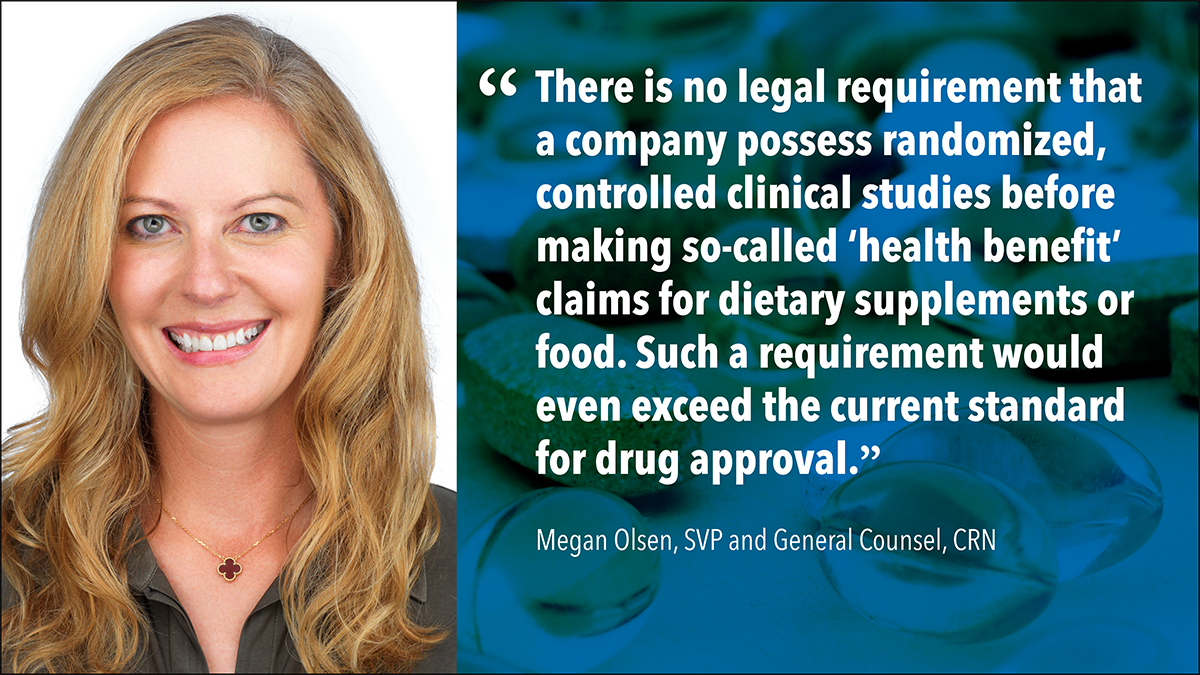SEPTEMBER 25, 2023
WASHINGTON – The Council for Responsible Nutrition (CRN), the leading trade association representing the dietary supplement and functional food industry, last week filed a petition with the Federal Trade Commission (FTC) requesting the Commission clarify certain aspects of its new Health Products Compliance Guidance.
CRN’s submission details concerns the association has with the FTC’s guidance, which misrepresents the state of the law with respect to advertising substantiation for dietary supplements and food. In its petition, CRN specifically noted that:
- there is no bright-line requirement for randomized, controlled trials (RCTs) before making "health benefit" claims for dietary supplements or food;
- there is no requirement for full product testing versus testing of certain ingredients
- professionals like nutrition researchers, nutritionists, and pharmacologists can be suitable scientific experts to assess claim substantiation for dietary supplements and food.; and
- the new guidance fails to align with the claims regimes Congress created for dietary supplements and food, versus drugs, and suggests, erroneously, that marketers of supplements and food may lawfully use disease claims if supported by randomized clinical trials.
In simple terms, the FTC’s new guidance discourages the dissemination of truthful nutrition information because it constructs a impression that RCTs are required for general well-being and structure/function claims, with no flexibility for the consideration of other forms of reliable evidence. It is not a solution to say companies should commission RCTs for all nutritional support claims out of an abundance of caution, because such studies are not always the most appropriate form of scientific evidence to demonstrate the general health effects of dietary ingredients. CRN provided numerous examples of where RCTs would, at most, have shown the effects of deficiency of a nutrient, and could be unethical given the necessity of many nutrients to human health.
“There is no legal requirement that a company possess randomized, controlled clinical studies before making so-called ‘health benefit’ claims for dietary supplements or food,” said CRN Senior VP and General Counsel Megan Olsen. “Such a requirement would even exceed the current standard for drug approval.” She said that FTC is relying heavily on statements that suggest “bright line” requirements for randomized clinical trials. And that, while “there is definitely a place” in the substantiation regime for those types of studies, FTC needs to consider the type of claim being made and develop guidance that allows for flexibility.
Hear General Counsel Megan Olsen and Keller & Heckman partner Katie Bond discuss the guidance in our 'Take 5' video
“The FTC can no more change court precedent through guidance than it can, through guidance, convert ‘competent and reliable scientific evidence’ from a factual standard to a legal requirement for RCTs,” added Olsen.
As a matter of law, the FTC cannot impose a one-size-fits-all standard, requiring specific types of clinical studies or even requiring clinical studies at all. The FTC failed to convince courts in several cases that dietary supplement structure/function claims require the high level of RCT support the agency is now advancing in its new guidance.
“Our hope is to work with FTC to develop guidance that isn’t overly burdensome on industry, while ensuring that Americans receive information about supplements that is sensible, scientifically sound and useful,” added Olsen.

The Council for Responsible Nutrition (CRN), founded in 1973, is a Washington, D.C.-based trade association representing more than 200 dietary supplement and functional food manufacturers, ingredient suppliers, and companies providing services to those manufacturers and suppliers. In addition to complying with a host of federal and state regulations governing dietary supplements and food in the areas of manufacturing, marketing, quality control and safety, our manufacturer and supplier members also agree to adhere to additional voluntary guidelines as well as to CRN’s Code of Ethics. For more information, visit www.crnusa.org. Follow us on Twitter @CRN_Supplements and LinkedIn.

